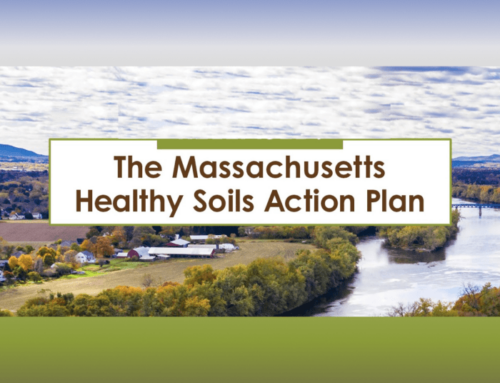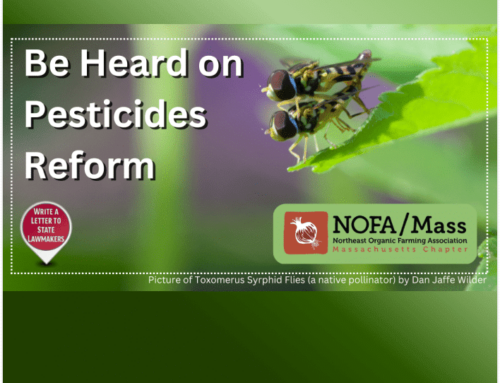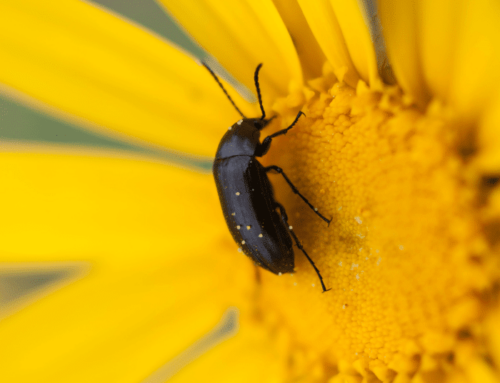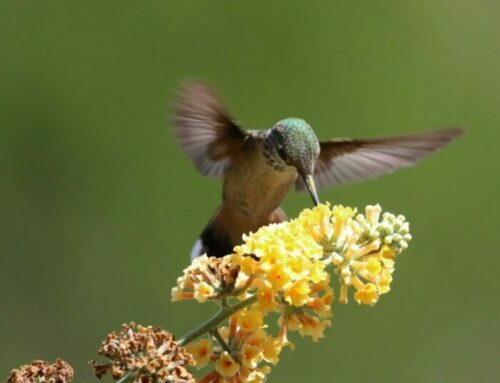On November 12th 2019, state legislators on the Environment, Natural Resources and Agriculture Committee heard five hours of passionate testimony from a packed room of advocates from around the state who are concerned about the effects of pesticides on humans, animals, insects and ecosystem health. Dozens of parents, teachers, beekeepers, farmers, landscapers, pediatricians and academics showed up to send a strong message to legislators that it’s time to limit pesticides use in Massachusetts!
Please add your voice to theirs by sending an email to legislators. Ask them to ban glyphosate (Monsanto’s Roundup) from being sprayed where children learn and play and to restore power to local municipalities so that they can control local pesticide use: bit.ly/childrencides
“At a time of climate crisis, rapid insect extinctions, declining bird populations and rising rates of chronic human illness, we must address how the pervasive use of synthetic toxic pesticides in our school yards, our farm fields and our communities contributes to this urgent situation,” begins a coalition statement endorsed by over 40 organizations, farms and businesses and submitted to legislators at the hearing by NOFA/Mass. “We know that we cannot rely on federal agencies to protect the American people and ecosystems from the threats of the overuse of pesticides… We are now counting on our state legislators to help us.” (Read the full statement here, which is still accepting endorsements.)
We at NOFA/Mass are grateful to the network of advocates from the Cape to the Berkshires who heard our call to action to attend the State House hearing. Here are some highlights and quotes from the testimonies delivered during the hearing:
– A group of grade-schoolers expressed fear over the chemicals used on their school playing fields.
– A woman carrying twins in her third trimester shadowed her two small children at the podium, who she would no longer allow to play on public land that abuts their home due to their planned use of glyphosate on invasive weeds, despite her respectful protests.
– Beekeepers brought totes of dead bees to accompany the reported MDAR statistics of a statewide hive loss rate of 50%.
– Two women shared their health struggles from cancer to hypothyroidism caused by pesticide exposure.
– Biologists, scientists, doctors and health practitioners took their turns in front of the panel to share research indicating that pesticides are harmful to human health.
“I am here for a very specific reason: I do not want my children, or anyone else’s, exposed to Roundup and other synthetic herbicides that may be about to be sprayed on conservation land right next to our house, and next to our neighbor who runs an in-home daycare. – Kaedra Walsh, Littleton resident attended with her two children (and twins due in December!), testified in support of S.447/H.776, An Act empowering towns and cities to protect residents and the environment from harmful pesticides and H.791, An Act relative to improving pesticide protections for Massachusetts schoolchildren.
“As Public Health Chair… I’ve dug into the harmful effects of glyphosate on public health… As the state moves to restrict these chemicals, I would suggest that we give strong consideration to a just transition… grant programs and training programs to help farmers make a transition.” – Sen. Jo Comerford, speaking in support of S.447, S.463 and S.499.
“Children are especially vulnerable to pesticide exposure…All children in the Commonwealth deserve safe schools where they can learn, play and grow, so it’s time for us to update the rules on the use of pesticides on schoolgrounds.” – Sara Dewey from Conservation Law Foundation, in support of H.791, An Act relative to improving pesticide protections for Massachusetts schoolchildren.”
“The incidence of leukemia in the United States has seen the fastest rise among Hispanic children… Oncologists and epidemiologists speculate that this is because of the most intense exposure to pesticides in agricultural workers.” – Dr. Julia Koehler, representing the American Academy of Pediatrics, was the last witness to speak after nearly five hours of testimony.
What’s next for these bills?
In the weeks following the public hearing, the committee will consider the pesticide-related bills before them (see a full list with breakdown of the bills, here). They have until March 2020 to “report them” out of the committee. The legislative process is a labyrinth — and the chemical lobby is already working to kill these bills. We must speak up now, and often, in greater numbers, and with a stronger voice. Please take action by contacting your legislators today and help activate your friends and family for a less toxic Commonwealth.
UPDATE: On November 18th, 2019, the committee passed one of our priority bills, the Pollinator Protection Act (H.763)! More details on that update, below.
Ways to take action to support state legislation to reduce pesticides:
- Take quick action, here, by customizing a form email to your state legislators: bit.ly/childrencides
- Ask your friends and family to take action (see #1).
- Get to know your state legislators/staffers. Be sure they know how important this issue is to you. Call them. Visit their district or State House office. Get in touch with NOFA/Mass to “adopt” your legislators.
TAKE ACTION NOW
Whether or not you could attend the Nov. 12th Public Hearing on Pesticides (see above), your legislators need to hear from you! Please take action through the below action page and share it with your networks so that we can increase awareness among legislators of the need to reduce pesticides in the days leading up to the hearing:
***TAKE ACTION NOW to “Ban Glyphosate (and other toxic pesticides) from Playgrounds and Schools in Massachusetts”*** http://bit.ly/childrencides
Write and then call your legislators!
A phone call will multiply the impact of your email 10 fold. Please pick up the phone and call your state senator and representative.
You can look up your state senator and representative, here https://openstates.org/
When you call, you’ll be talking with a staffer (or be referred to a voicemail) and it will be easy, we promise!
(It’s worth then looking at the list of members of the committee hearing these bills. If one of them is yours, lucky you! Your call is has an even greater impact, as your legislator directly help pass the bill. You can tailor your message as below.)
When they pick up the phone, ask to speak with someone in the office of [Representative/Senator Lastname]. You can then say something simple like:
Hi My name is [NAME] and I live in [TOWN]. I’m calling to urge [Representative/Senator Lastname] to
support the pesticide bills currently before the Joint Committee on Environment, Natural
Resources and Agriculture.
The pesticides addressed, glyphosate and neonics, are very toxic to both people and pollinators
like bees. All of these bills would help us keep people and the environment safe from toxic chemicals.
At the very least, I hope that they will support H.791 to ban toxic pesticides from playgrounds, and S.447/H.776 to restore power to local municipalities to restrict pesticides.
Please support action on pesticides this session and submit testimony to the ENRA committee in support of these bills.
[If your legislator is on the committee] Please pass these bills from your committee as soon as possible.
Represent an organization or business?
Please endorse our “coalition sign-on letter, here”
Thank you to the following organizations for endorsing our coalition effort to reduce pesticides in Massachusetts!
Regeneration Massachusetts, Berkshire Environmental Action Team (BEAT), Beyond Pesticides, Caretaker Farm, Seeds of Solidarity, Gardening the Community, Boston Organics, LandscapeInteractions LLC, Toxics Action Center, GreeNA, Ivory Silo Farm, MASSPIRG, Marion Institute, Western Mass Pollinator Networks, Round the Bend Farm, Trillium Asset Management LLC, Adrian’s Atrium, Global Environmental Options, POCCA Cape Cod, Meadowscaping for Biodiversity, Full Circle Earth, The New Garden Society, Concerned Citizens of Franklin County, The Enviro Show, RESTORE: The North Woods, Pumpkin Brook Organic Gardening Inc., Sustainable Shrewsbury Citizens Network, Red Fire Farm, Living Earth,
Berkshire Grown, Inc., Massachusetts Sierra Club, GreenCAPE, Island Grown Initiative, Bionutrient Food Association, Great Barrington Agricultural Commission
(List updated 11/07/19)





